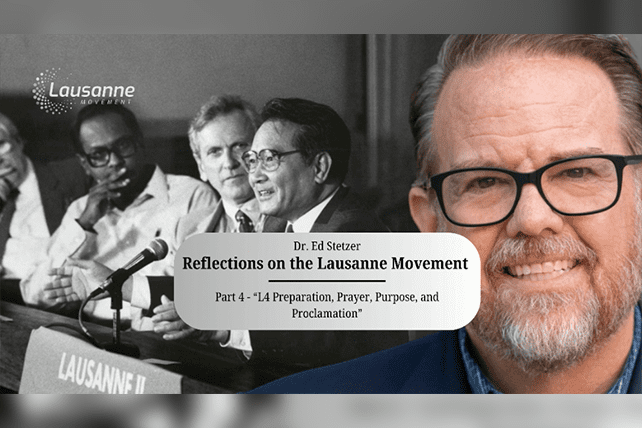I’ve been sharing a series of articles and videos leading up the the Lausanne Global Congress. I do not speak for the Lausanne Movement, but these are my thoughts (and, in some cases, concerns) as we head into L4 in Korea later this month. You can find the other parts here: Part 1, Part 2, Part 3.
As global evangelicals prepare for the Lausanne Movement’s fourth global congress (L4) in Seoul, Korea, we must reflect on the theological foundations that have guided the movement since its inception.
The Lausanne Movement has convened evangelicals for 50 years for the cause of world evangelization. Along the way, the movement has always recognized the importance of balancing theological clarity with missional urgency.
Because these principles remain as vital as ever, I want to reflect on maintaining theological integrity, fostering candid cooperation, and ensuring that our mission remains focused on both proclamation and action. These themes will be central to our discussions at L4, and I hope they will also serve as a guide for approaching the challenges and opportunities ahead.
The Importance of a Theological Foundation
The Lausanne Movement was founded on the conviction that global missions must be undergirded by sound theology. Lausanne’s founders, such as Billy Graham and John Stott, had seen the failures of the “conciliar” missions movement. At the 1910 World Missionary Conference in Edinburgh, Scotland, John Mott and other leaders attempted to unify Christians from various denominations by emphasizing the centrality of Jesus. But they didn’t define or enforce a robust, biblical view of Jesus, so many easily defined “Jesus” in unbiblical ways. The movement drifted from its evangelical roots, culminating in the absorption of the International Missionary Council (IMC) into the World Council of Churches (WCC).
Because that movement had failed to define its theological center or enforce theological boundaries, it lost its way. While initially focused on world evangelization, the movement gradually shifted toward social justice and social transformation. While these are important aspects of the church’s mission, they should never overshadow the primary task of proclaiming the gospel. The movement had all but lost its emphasis on personal conversion and church planting and never recovered them.
For evangelicals, both 50 years ago and today, the example of the “Edinburgh Error” has underscored the importance of having a clear theological basis for mission work. L4 must reaffirm our commitment to the theological principles that have guided the Lausanne Movement since its inception. We must recommit to a clear understanding of who Jesus is, as revealed in Scripture, and to proclaiming the gospel as the power of God for salvation.
I hope the document from L4 reflects the theological convictions of the Cape Town Commitment, the theological statement of the third Lausanne Congress. This statement serves as a theological anchor for evangelicals worldwide, emphasizing both gospel proclamation and social action. It calls the global church to participate in God’s mission of reconciliation, justice, and peace, advocating a balanced approach that upholds evangelism as primary while also addressing social transformation.
I appreciate the Cape Town Commitment to the point that I wrote an eight-week study based on it with Eric Geiger, Theology and the Mission of God. The principles of the Cape Town Commitment should guide discussions and ensure that our theological stance remains rooted in a robust understanding of the gospel and the church’s mission for L4.
Candid Cooperation: Unity in Diversity
The Lausanne Movement has always brought together evangelicals Christians from diverse theological backgrounds for the common purpose of world evangelization. This “candid cooperation” has allowed us to work together effectively, even when we disagree on secondary issues such as modes of baptism or church governance.
Candid cooperation requires honesty about our differences and focusing on what unites us—our shared commitment to the gospel and the mission of the church. We must candidly acknowledge that we don’t all agree on every point of theology, while insisting that we can work together to proclaim the good news of Jesus Christ to a world in need.

